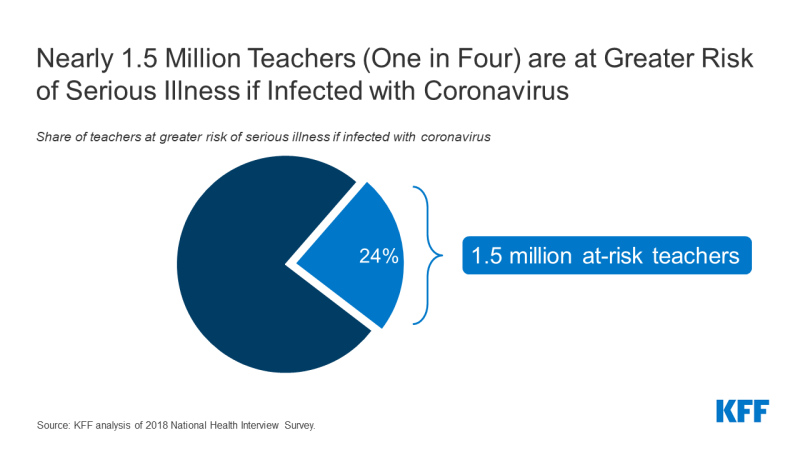How Many Teachers Are at Risk of Serious Illness If Infected with Coronavirus?
As the nation continues to struggle to contain the spread of coronavirus, there is considerable debate about when and how to reopen schools. Education is primarily a state and local concern, and although they have received mixed guidance from federal officials, the decisions over reopening will be made at the state and local level.
One of the myriad of issues these officials will face will be how to keep school employees safe at work, particularly those who are at increased risk of serious illness if they become infected with coronavirus. The Centers for Disease Control have identified a number of factors that put individuals at increased risk of serious illness if infected; these include several health conditions, including having diabetes, chronic obstructive pulmonary disease (COPD), heart disease, moderate or severe asthma, having a body mass index (BMI) of greater than 40, or having a compromised immune system, which for example, may occur during cancer treatment. Being age 65 and older also is considered to be a risk factor. In a previous study, we reported that almost one in four workers are at higher risk of severe illness if they were to become infected. While children are at less risk for serious illness from coronavirus than adults and often have mild or no symptoms when infected, the teachers and other adult staff in schools face higher risk. We used a similar approach to look at teachers and other instructors, and we find that one in four teachers (24%, or about 1.47 million people), have a condition that puts them at higher risk of serious illness from coronavirus (Figure). This percentage is the same as the one we found for workers overall; the challenge for school systems and for teachers in particular is the sheer volume of traffic and tight quarters in many school environments, which may make social distancing a significant challenge in many settings. For higher-risk teachers, failure to achieve safe working conditions could have very serious results.

Nearly 1.5 Million Teachers (One in Four) are at Greater Risk of Serious Illness if Infected with Coronavirus
Given the difficulty of maintaining social distancing in a crowded school environment, these at-risk teachers may be reluctant to return to their schools until infection rates fall to much lower levels. At the same time, teaching is not a particularly high-paying profession, so many teachers may feel economically compelled to return to their schools if they reopen, even if those teachers do not feel safe. How state and local officials balance the desire to reopen schools and other facilities with the need to assure the safety of students, parents, and school personnel will have significant health and economic consequences for both people and the communities they live in. Assuring the safety of teachers and others at higher risk of serious illness from coronavirus is a crucial part of the calculation around reopening.
Methods
This analysis uses data from the 2018 National Health Interview Survey (NHIS) to look at the share of workers who would be at increased risk of becoming seriously ill if they become infected with coronavirus. The risk factors we were able to analyze were having diabetes, chronic obstructive pulmonary disease (COPD), heart disease, a body mass index (BMI) above 40, and a functional limitation due to cancer. As we previously discussed we included 62% of those with asthma none of the other risk factors, as at risk. In addition, the CDC criteria consider all people over age 65 to be at increased risk. We define teachers as individuals whose occupation is “primary, secondary, and special education school teachers” or “other teachers and instructors,” and are employed in the “Education Services Industries” industry. Only teachers who are currently working, looking for work or on a temporary absence such as a planned vacation, maternity leave or temporary medical leave were included.
